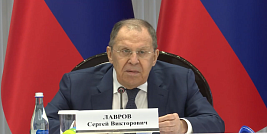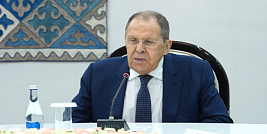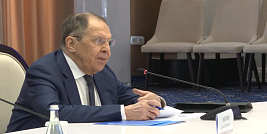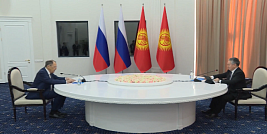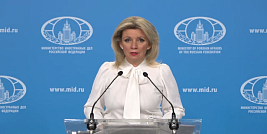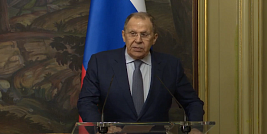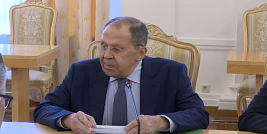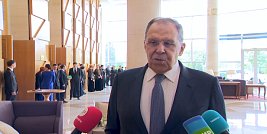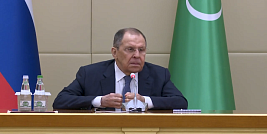Foreign Minister Sergey Lavrov’s answers to media questions following a meeting of the CSTO Council of Ministers, Cholpon-Ata, June 30, 2025
Question: How do you assess the current developments in Armenia? Was this issue addressed during today’s closed meeting? Do CSTO member states plan to respond in the event of a sharp escalation in Armenia?
Sergey Lavrov: Yes, the situation in Armenia was discussed. All participants expressed deep concern over the events unfolding within the republic. While it is understood that this is an internal matter for our neighbours, we are particularly troubled by the attacks on the Armenian Apostolic Church – a canonical institution with a thousand-year history. The church has traditionally been a cornerstone of Armenian society, and Russia is concerned about any unjustified and unprovoked actions directed against it. We note that the public movement in defence of the church reflects a strong sentiment within Armenian society, rooted in its deep Orthodox traditions inherent to Armenia. Russia hopes the current tensions will be resolved promptly, in full accordance with Armenia’s Constitution and with respect for the rights of believers and fundamental human rights.
As for today’s discussions concerning Armenia’s participation in the CSTO, we took note of the fact that Armenian Foreign Minister Ararat Mirzoyan once again declined to attend the event. We proceed from the understanding that, during meetings within the framework of the Collective Security Treaty Organisation, our heads of state acknowledged Armenia’s current stance towards the CSTO.
We continue to regard Armenia as a full member of the Organisation. However, full membership entails active participation and adherence to all obligations set forth in the CSTO’s foundational documents, including the payment of membership dues.
Statements from the Armenian leadership suggest that the country is pursuing a multi-vector approach. Recently, Armenian Prime Minister Nikol Pashinyan indicated that Armenia will soon need to make a choice between the Eurasian Economic Union and the European Union. Additionally, representatives of the Armenian leadership have acknowledged that a definitive decision regarding their membership in the CSTO will need to be made in the near future.
Russia is exerting no pressure on Armenia’s leadership and prefers to wait for clarity on these important matters. It is widely understood that should Armenia distance itself from its allies, closest partners, and neighbours, such a course is unlikely to serve the interests of the Armenian people.
Question: Are you following the developments in Belgrade? What is your assessment of current events over there?
Sergey Lavrov: We are following the developments, of course. We are interested in the unrest being quelled, as President of the Republic of Serbia Aleksandar Vucic said, based on the Constitution and laws of this friendly state. Our great hope is that the Western nations, which, as usual, are attempting to use some or other domestic events in various countries to promote their own interests to the detriment of those of partners in relevant countries, will not, in this case, engage in colour revolutions. Serbia has repeatedly faced problems of this sort and we are in favour of the protesters complying strictly with Serbia’s laws. We also see that the Serbian leaders are ready for dialogue. After all, it is dialogue that opens the path to dealing with any issues.
Question: Last week, there were facts on record that Ukrainian drones passed through Kazakhstan’s airspace to deliver strikes at facilities in Russia. Moreover, it is not for the first time that these flights were recorded. Did you discuss this with Foreign Minister of Kazakhstan Murat Nurtleu?
Sergey Lavrov: We have mentioned this. We have taken into consideration the fact that the relevant services in our countries, specifically the military and the security services, are in contact over this matter. Our Kazakhstani friends have assured us that they are taking measures, in their contacts with Ukraine, to put an end to this practice.
Question: Polish Foreign Minister Radoslaw Sikorski went on record as saying that Russia would collapse if it continued to build up its military spending. NATO for its part increased its military budget by an order of magnitude just a few days ago. What is your comment on statements of this sort?
Sergey Lavrov: Well, if Mr Sikorski is a prophet on this scale, he may perhaps visualise that what I see as a disastrous boost in the NATO military budget will lead to the collapse of this organisation. Russia, for its part, is planning to cut its military expenditures, as President Vladimir Putin told a news conference following a meeting of the Supreme Eurasian Economic Council in Minsk on June 27, 2025. Russia is guided by common sense, not pretended threats, as NATO member countries, including Mr Sikorski’s Poland, do.

